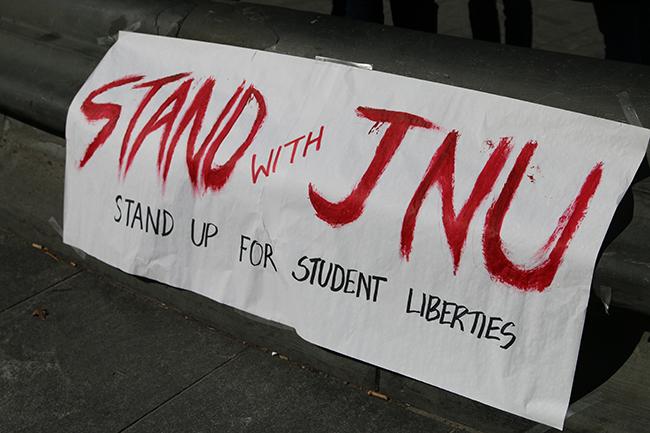Solidarity Across Oceans for Free Speech
Students from NYU and Cooper Union gathered at Washington Square Park to stand in solidarity with JNU.
February 29, 2016
NYU and Cooper Union students gathered in Washington Square Park on Saturday to express their solidarity with students at Jawaharlal Nehru University who were arrested for dissenting against the Indian government.
JNU is a prominent university in New Dehli, India that attracted international media attention after its student’s union President, Kanhaiya Kumar, was arrested in February for holding a poetry reading and critiquing the Indian government’s lack of transparency. In response, student protests have broken out at various universities within India and also in the United States to express their support for Kumar and other students who have been arrested.
CAS senior Anjana Sreedhar spoke at the rally, saying one of the primary purposes of the event was to raise awareness about Kumar’s arrest, especially among local students of South Asian descent.
“[Kumar] was arrested for making these comments against the government, even though he wasn’t actually saying anything against the government, he was just having this poetry reading,” Sreedhar said. “We’re protesting against the fact that he was arrested under the sedition law which is very very antiquated and very outdated.”
The law was created during the British colonial period, arresting citizens for expressing views against the government. Its persistence has been counter productive to India’s role as the world’s largest democracy.
Sreedhar and several other NYU students read aloud English transcripts of Kumar’s speech during the poetry reading and asked if his words warranted arrest. They also encouraged passersby and attendees to attend a forum discussion at Cooper Union next week.
Gallatin junior and Incarceration to Education Coalition organizer Sumathy Kumar said she attended the rally because as an NYU student, she has the privilege to voice her opinions while the students at JNU are suppressed for doing so.
“I’m an organizer on campus and I’m an activist, and I think we take it for granted sometimes that we have the right to dissent and that home where my parents are from and where I call my ancestors are from, they’re not allowed to dissent,” Kumar said. “They’re being beaten and arrested and so much violence is being committed against them just for speaking out and I need to do something to show my support.”
Anthropology professor Tejaswini Ganti said that she was glad students were voicing support for JNU’s students and that universities should be an open forum for all opinions — even those that dissent against the governing party.
“If one disagrees with certain views, the reaction is not to clamp down and arrest or resort to violence, which is what has been happening in India, but to actually be able to have an open exchange of ideas,” Ganti said. “I think the Indian government, the ruling party, does care about what the world thinks, and I think having the fact that so many universities across the world expressing their dismay at what’s been happening, I hope that that will make the people who are responsible for that kind of crackdown to think again.”
A version of this article appeared in the Monday, Feb. 29 print edition. Email Anne Cruz at [email protected].



























































































































































